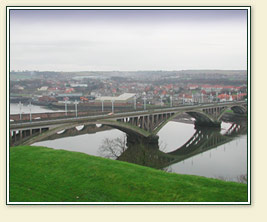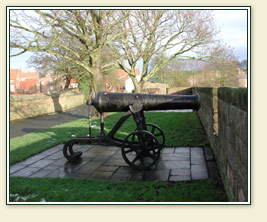Berwick Upon Tweed, lying at the mouth of the River Tweed is a town with a rich, and often turbulent history.
Despite no official records pre-dating 1095, it can be safely assumed that Berwick was already a bustling town before this date as in 1018, King Malcolm of Scotland designated the Tweed as the end of his boundary signifying Berwick's beginning as a frontier town and port.
 During this period, under the reign of David of Scotland, the town became a royal burgh and gradually grew into Scotland's most affluent port town being described as, "So populous and of such commercial importance that it might rightly be called another Alexandria, whose riches were the sea and the water its walls".
During this period, under the reign of David of Scotland, the town became a royal burgh and gradually grew into Scotland's most affluent port town being described as, "So populous and of such commercial importance that it might rightly be called another Alexandria, whose riches were the sea and the water its walls".
Berwick came under attack many times and was actually destroyed in 1216. Shortly after recovering from this onslaught in 1296 the town was sacked and most of its inhabitants slaughtered in what could only be described as a massacre carried out by King Edward I of England..
Following this disaster, Berwick suffered more attacks, with the troubles finally ending in 1482, when it was taken by the English. The town has remained an English town ever since and received many of its defining architectural features in the time of peace and prosperity that followed.
Of these features the Elizabethan walls which still surround the town are perhaps the most obvious.
Re-built to an Italian style in the 18th century the walls were gunned and turreted to form a seemingly impenetrable wall of rock that enclose the town on all sides and boast an imposing outlook over the mouth of the River Tweed.
 The walls provide a physical testament to Berwick's huge political importance. Such was this importance that when the Crimean war was declared, Queen Victoria allegedly signed, Victoria, Queen of Great Britain, Ireland, Berwick-upon-Tweed and all British Dominions".
The walls provide a physical testament to Berwick's huge political importance. Such was this importance that when the Crimean war was declared, Queen Victoria allegedly signed, Victoria, Queen of Great Britain, Ireland, Berwick-upon-Tweed and all British Dominions".
This declaration unfortunately left Berwick at war with Russia long after the Crimean war had ended with the official peace treaty only being signed in 1966!
In more recent times, Berwick received its third bridging of the Tweed with the opening of the Royal Tweed bridge in 1927, which at the time became Britain's longest road bridge at a length of 1410 feet.
Since that date, the town has developed in to a thriving coastal and market town that still retains its wonderful mix of architecture and sense of historic grandeur which makes it a truly unforgettable location for a memorable stay.